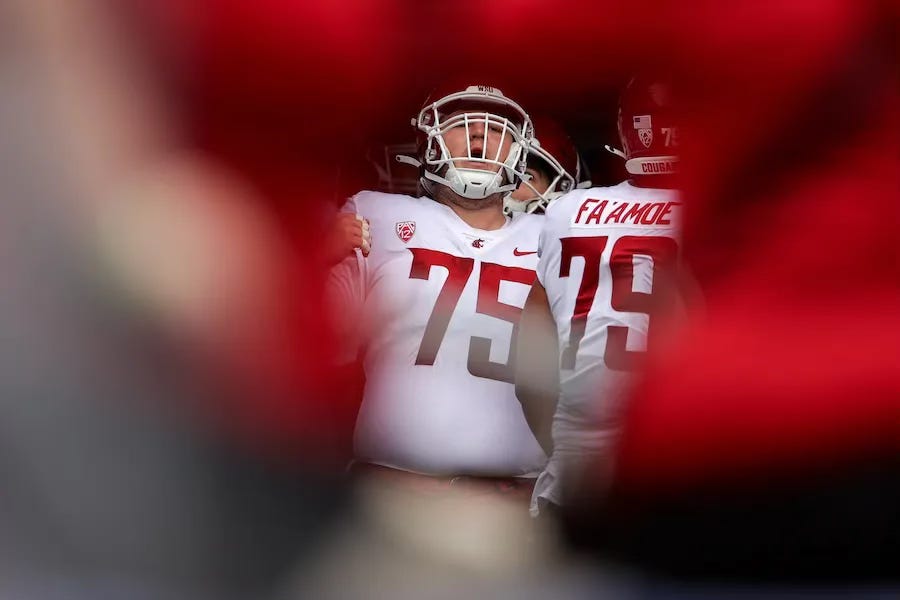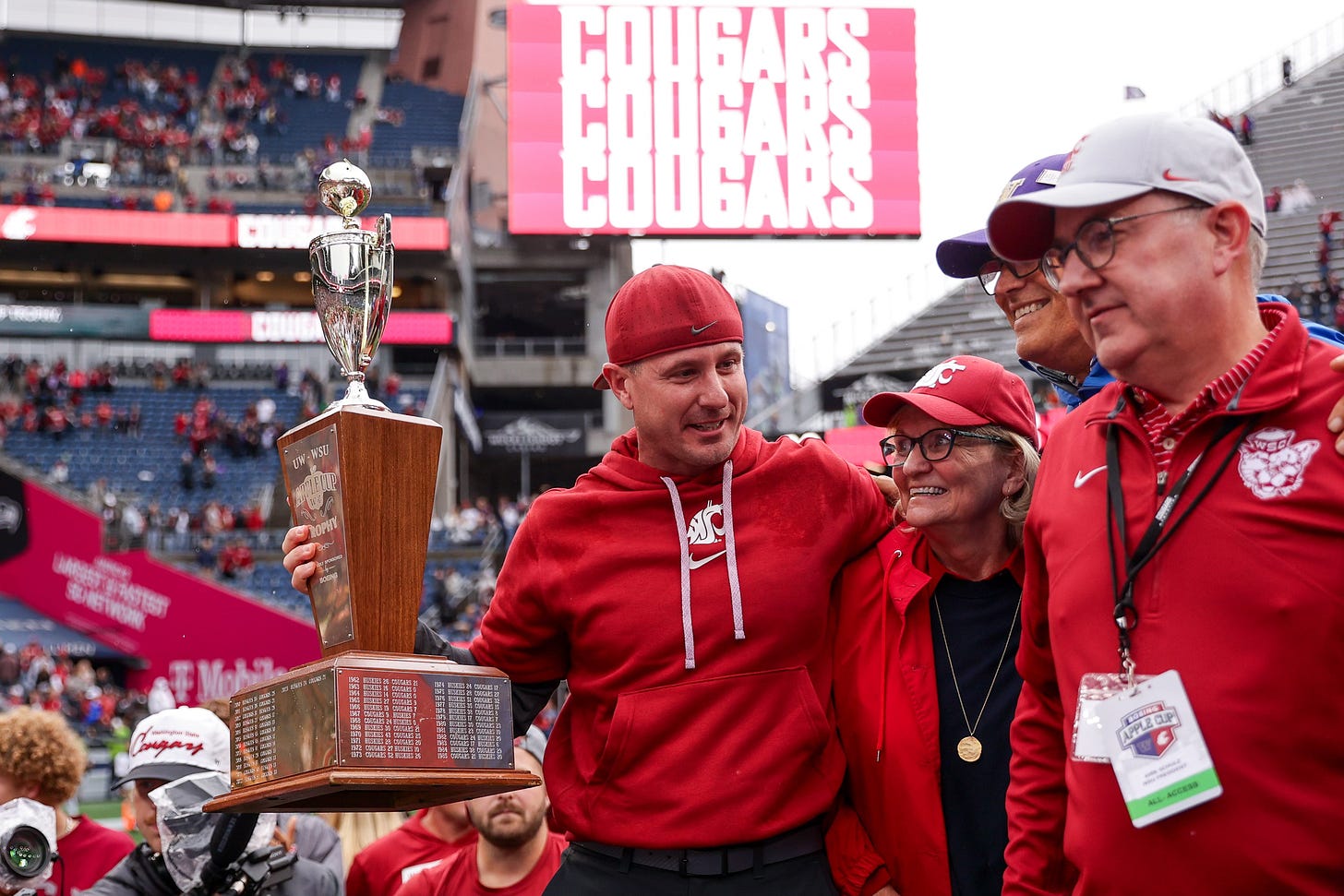Canzano: Washington State problem comes into focus
Football program had $2 million coming... and didn't know it.
The Board of Regents at Washington State University held a mid-November meeting at The Edgewater Hotel in downtown Seattle.
WSU President Kirk Schulz was in the room. Breakfast was served. The group dined on eggs, bacon, sausage patties, coffee, tea, and juices. Also on the menu that morning — a directive from the regents to Schulz.
Schulz’s bosses told him to work with Leslie Brunelli, the school’s chief financial officer, to find an additional $2 million in institutional support for athletics. The president was instructed to get the funds and report back.
Per a source close to the board: “That didn’t happen.”
Jake Dickert, Washington State’s 41-year-old football coach, left the school for a job at Wake Forest last week. The Demon Deacons aren’t a football powerhouse. Dickert didn’t have regional ties to the Winston-Salem region or administrators at the school. It was a curious career move by a coach who preached loyalty.
Dickert’s defection to a low-tier ACC football program set off alarm bells about the financial dynamic at WSU. I spoke with Dickert, Schulz, several of the WSU regents, university staff members, and Anne McCoy, the school’s athletic director, in the last week. What I’ve learned helps frame the coach’s departure and raises questions about the leadership dynamic in Pullman.
Said Enrique Cerna, one of the WSU regents: “We care deeply about athletics. It’s important for the university. It’s a big draw. Other things on campus need to be funded, sure, but the regents gave that directive because we care about athletics.”
Schulz told me: “If I had a money printing press in my office — this would be no problem.”
The president eventually found the $2 million in support. That’s not the issue. But Schulz failed to inform McCoy, his AD, that new money was coming. McCoy confirmed that she first learned about the money in an email exchange with the regents on Sunday, several days after Dickert was introduced at Wake Forest.
The email, obtained by JohnCanzano.com, reveals that it might not be just $2 million, either. There was another $4 million potentially on the table for athletics in “matching funds” and, perhaps, a gift from the university’s fundraising foundation.
Said McCoy: “We would have absolutely used the funds for football.”
There’s growing tension between the WSU regents and Schulz these days. Fans and donors are frustrated, too. The president is retiring next summer. The board is currently conducting final candidate interviews, searching for Schulz’s successor.
“We’ve got to get this hire right,” said one board member.
One of the initial points of friction between regents and the president was sparked by the break-up of the Pac-12 in August of 2023. Board members were frustrated that they had to push Schulz to join Oregon State in the lawsuit against the 10 departing members of the Pac-12. That lawsuit resulted in a $255 million windfall settlement for OSU and WSU.
Said someone close to the board: “WSU wouldn’t have sued and won if the regents hadn’t intervened there. Kirk didn’t seem interested in suing.”
Some may find that puzzling to hear.
Schulz has long been viewed as a ‘pro-sports’ university president who understands the value of athletics. It’s caused him angst on his campus, where academics sometimes roasted Schulz for it. But in recent months, with retirement looming, he’s shifted his public stance considerably.
Schulz told me last week: “There are real decisions on whether to spend our money for athletics or perhaps the College of Medicine or the College of Engineering. It’s easy for football fans to say to spend more money on athletics, but that takes money from core academic funding.”
Some wonder if Schulz is being more mindful of his legacy and wants to be remembered as a president who fiercely supported the academic mission. Others think he’s stubborn and refused to support Dickert because he doesn’t care for the coach.
Dickert and Schulz appeared to be united in public appearances, but they had some tense moments behind the scenes, sources say. It came to a head in the final month of the football season when the Cougars struggled on the field and went 1-3.
Schulz told me: “My interactions with Jake were always cordial and professional.”
One university source who saw both men regularly described their working relationship as “petty and personal,” however. The president told me on Tuesday that he appreciated the job Dickert did and reinforced that he was “a great ambassador” for Washington State. But Schulz told one staff member that he was annoyed that Dickert frequently brought up the need for additional resources in public interviews.
The coach back-channeled with regents and high-level donors, too. More than one board member told me that Schulz discouraged regents from having contact with WSU’s athletic director and coaches. Said the person: “He didn’t like us being in contact.”
Schulz and Dickert had a critical meeting in November during the team’s second bye week. The tone of it raised alarm bells and foreshadowed the eventual departure of Dickert.
Dickert’s football program was doing everything it aimed to do — staying relevant and being bantered about as a potential College Football Playoff candidate. The Cougars were 7-1. But behind the scenes, there was growing concern that the operation was about to fall apart.
Washington State’s assistant coach salary pool was $5.9 million in Dickert’s second season. It was trimmed to $4.9 million for the 2024 season. After the budget for 2025 was set, Dickert was informed that there would be further cuts to $3.5 million, per McCoy.
Schulz and Dickert met in the coach’s office during that second bye week. Per an athletic department source with knowledge of the meeting, Dickert walked Schulz around the office and introduced him to support staff, assistants, and other personnel.
“Jake was trying to humanize it. He was was like, ‘Hey, these are the people’s lives you’re going to impact,’” said the source.
The rest of the sitdown didn’t go well.
According to a source with knowledge, Schulz said to Dickert: “I don’t mind being the president known for ‘right-sizing’ the football program.”
The president told Dickert that the campus budget was already baked, and there were no additional resources. WSU had cut $11 million from the budget for the fiscal year. Schulz said he couldn’t help. The meeting ended with Dickert warning Schulz that coaches were likely to leave if WSU cut the salary pool again.
Schulz told me: “No one likes hearing that we don’t have the money to do something — and the job of communicating that falls on the president.”
Dickert offered no comment on the meeting and no thoughts on Schulz, specifically. He’s off to his new gig at Wake Forest. But last week, in an exit interview, the former WSU coach told me: “The investment piece is now what college athletics is about, period. And that’s investing in coaches and people. It’s now people capital. And to continue to do that and to maintain that has been difficult.”
It didn’t take long for the regents to find out about that early November meeting between Dickert and Schulz. Less than two weeks later, on Nov. 14, the board sat down with the president over breakfast in Seattle and directed Schulz to find $2 million in institutional support for athletics.
It wasn’t an ask.
It was an order.
Schulz told me: “The board has complete authority over me as president. They directed me to work with our AD on a proposal. This took some time to do.”
Nearly six weeks passed before the AD learned about the $2 million that is now available to her. Schulz obtained the money. McCoy can utilize it to help attract a new coaching staff.
“We discussed several ideas on matching funds and did not feel they would be appropriate or work,” Schulz told me. “Recently, we scrapped the matching funds idea and just committed the money.
“Jake and his departure were not a factor either way.”
In the final weeks of the football season, the Cougars lost multiple games, assistants made plans to take other jobs, players packed up and eyed the transfer portal, and Dickert grew increasingly discouraged.
Also, Wake Forest made contact with Dickert’s agent and offered the coach better resources.
Said a board insider: “I think Kirk dragged his feet.”




Looks like another case of a PAC President making terrible decisions.
John, this is INCREDIBLE reporting. Everyone from WSU thanks you for exposing the BS that is going on behind the scenes at our beloved school. Without you, this truth may never have come to light, and for that you are the G.O.A.T 🐐
Thank you for always fighting for the little guys. Merry Christmas to you and yours!